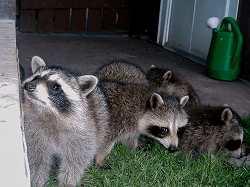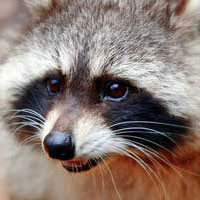What is Raccoon Roundworm?
Raccoons carry the intestinal parasite Baylisascaris procyonis which is raccoon roundworm. Infected raccoons shed millions of eggs in their feces, which in turn infect the environment. The most common method people become infected with raccoon roundworm is through contact contaminated soil. Raccoon feces deposited on your roof will wash down to the soil when it rains. When people garden or are working in soil or in sandboxes, they may become infected. It is very important to wash your hands thoroughly after gardening and children must also wash their hands thoroughly after playing in their sandboxes or in the garden. Make sure that everyone remembers to clean under their finger nails too.

Infection in humans with raccoon roundworm is very difficult to diagnose. As humans are an intermediate host, the raccoon roundworm does not mature in a human host. The larvae migrate through human tissue – liver, central nervous system, brain, and eyes. Symptoms of infection: irritability, nausea, loss of coordination, liver enlargement, loss of eyesight, coma.
Cleaning up raccoon poop requires special care as the raccoon roundworm eggs are resistant to chemical and detergent type cleaning products. Visit our page on cleaning up raccoon poop to prevent roundworm infection for more information.
If you are concerned about you or your family becoming infected with raccoon roundworm due to the presence of raccoon around your home, you can take action to remove and control their populations. Hawkeye are experts in permanent removal of raccoons and we can help you with proper removal of raccoon poop to lower the contamination risk. Remember, it is illegal to trap and relocate raccoons on your own. We can help.
















